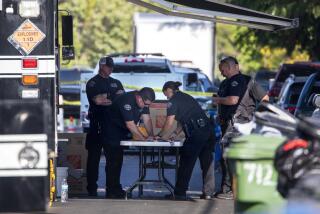Charges Are Dropped in Deadly Scrap-Yard Blast
- Share via
Military munitions expert Timothy Collister walked into a courtroom in San Bernardino on Friday expecting to learn the date for his murder trial in connection with a 1997 explosion that killed a scrap-yard worker. Instead, Collister walked out a free man.
The judge surprised many in the courtroom by throwing out murder and manslaughter charges against Collister, siding with defense attorneys who argued that Collister should not be held criminally liable for failing to prevent the tragedy.
“I’m terrifically relieved. I hoped and prayed that it would go this way,” said Collister, a 57-year-old Vietnam veteran who lives in Victorville. “This has messed up my life for the last year. . . . Now I just want to get my life back together for me and my family.”
The charges against Collister stemmed from the March 18, 1997, death of Martin Mendoza, a worker at a Fontana scrap metal yard who was killed while trying to dismantle what he thought was an inert military shell. Instead, the antitank shell--containing the equivalent of more than two pounds of TNT--blew up and killed the 22-year-old instantly.
The shell was among 1.4 million pounds of scraps that had been discarded by the Army’s Ft. Irwin training center near Barstow and sold to Dick’s Auto Wreckers for recycling. Collister, an ordnance specialist with the Air Force for 20 years, was the on-site manager for a civilian contractor at Ft. Irwin that was supposed to flag live munitions and clear the rest.
After Mendoza’s death, investigators cautiously combed through the heap at the scrap yard and found 55 other military pieces that were deemed “explosive” and never should have been transferred off the base, authorities said.
Collister was arrested on a charge of second-degree murder in November 1997. Four months ago, defense attorney James Blatt persuaded a judge to drop the murder charge, leaving Collister to face only an involuntary manslaughter charge.
The district attorney’s office refiled the murder charge and went to court Friday to find out when it could start trial. Instead, Superior Court Judge Brian S. McCarville threw out the charges.
Blatt said the judge seemed persuaded by the earlier court’s finding at the preliminary hearing that there was no evidence to suggest that Collister knew there were live explosives among the scraps sent to the yard. And Collister had followed a set procedure in signing a declaration asserting that the material was safe as best he knew, the lower court found.
Disappointed prosecutors may decide to refile charges or appeal the decision, said Deputy Dist. Atty. Charles Umeda.
“Certainly it was a surprise to me how the judge ruled,” Umeda said.
“I believe there was sufficient evidence that the case should have been allowed to go to a jury to decide,” he said. “The evidence would show that Mr. Collister was the person in charge of the facility at the time the live munitions left the [Ft. Irwin] compound, and he had overall responsibility. A higher degree of care should have been exercised.”
But defense attorney Blatt maintained in an interview that Collister has been made “a scapegoat” for the military’s own liability because the Army tried to rush through the munitions cleanup.
McCarville’s decision “was a great victory for us,” he said. “It was a moment of just tremendous relief and jubilation.”
Collister and other parties in the incident still face civil lawsuits brought by the victim’s family. The Mendoza family’s attorney could not be reached for comment.
More to Read
Sign up for Essential California
The most important California stories and recommendations in your inbox every morning.
You may occasionally receive promotional content from the Los Angeles Times.












